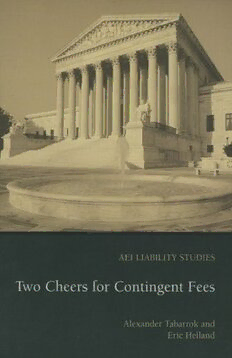Download Two Cheers for Contingent Fees PDF Free - Full Version
Download Two Cheers for Contingent Fees by Alexander Tabarrok Eric Helland in PDF format completely FREE. No registration required, no payment needed. Get instant access to this valuable resource on PDFdrive.to!
About Two Cheers for Contingent Fees
If America is a lawsuit hell, then contingent-fee lawyers are often considered its devils. Contingent fees have been called unwarranted and the lawyers who accept them have been denounced as unethical and uncivilized. Furthermore, in the midst of increased filings and escalating awards, it is difficult not to notice that some plaintiffs' lawyers have become very rich. As a result, tort reformers have called for limits on contingent fees and many states have obliged. But limits have been enacted without any evidence that contingent fees were either responsible for the liability crisis or that limiting them would produce benefits. This study, one of the first empirical examinations of contingent-fee limits, finds that contingent fees benefit plaintiffs and do not cause higher awards. Furthermore, contingent-fee limits are unlikely to reduce lawyers' income very much, since they will simply switch to hourly fees. Since hourly fee lawyers are willing to take more cases to court than contingent-fee lawyers, contingent-fee limits can increase the number of low-value junk suits. Tort reform is an important goal, but limiting the contractual rights of plaintiffs and their lawyers is an unattractive and likely ineffective method of achieving that goal. The AEI's Liability Studies examine aspects of the U.S. civil liability system central to the political debates over liability reform. The goal of the series is to contribute new empirical evidence and promising reform ideas that are commensurate to the seriousness of America's liability problems. Alexander Tabarrok is an associate professor of economics at George Mason University and director of research for the Independent Institute. Eric Helland is an associate professor of economics at Claremont McKenna College, a senior economist at the RAND Corporation's Institute for Civil Justice, and a member of the plenary faculty at the Claremont Graduate School.
Detailed Information
| Author: | Alexander Tabarrok Eric Helland |
|---|---|
| Publication Year: | 2006 |
| ISBN: | 9780844771939 |
| Pages: | 56 |
| Language: | English |
| File Size: | 0.487 |
| Format: | |
| Price: | FREE |
Safe & Secure Download - No registration required
Why Choose PDFdrive for Your Free Two Cheers for Contingent Fees Download?
- 100% Free: No hidden fees or subscriptions required for one book every day.
- No Registration: Immediate access is available without creating accounts for one book every day.
- Safe and Secure: Clean downloads without malware or viruses
- Multiple Formats: PDF, MOBI, Mpub,... optimized for all devices
- Educational Resource: Supporting knowledge sharing and learning
Frequently Asked Questions
Is it really free to download Two Cheers for Contingent Fees PDF?
Yes, on https://PDFdrive.to you can download Two Cheers for Contingent Fees by Alexander Tabarrok Eric Helland completely free. We don't require any payment, subscription, or registration to access this PDF file. For 3 books every day.
How can I read Two Cheers for Contingent Fees on my mobile device?
After downloading Two Cheers for Contingent Fees PDF, you can open it with any PDF reader app on your phone or tablet. We recommend using Adobe Acrobat Reader, Apple Books, or Google Play Books for the best reading experience.
Is this the full version of Two Cheers for Contingent Fees?
Yes, this is the complete PDF version of Two Cheers for Contingent Fees by Alexander Tabarrok Eric Helland. You will be able to read the entire content as in the printed version without missing any pages.
Is it legal to download Two Cheers for Contingent Fees PDF for free?
https://PDFdrive.to provides links to free educational resources available online. We do not store any files on our servers. Please be aware of copyright laws in your country before downloading.
The materials shared are intended for research, educational, and personal use in accordance with fair use principles.

